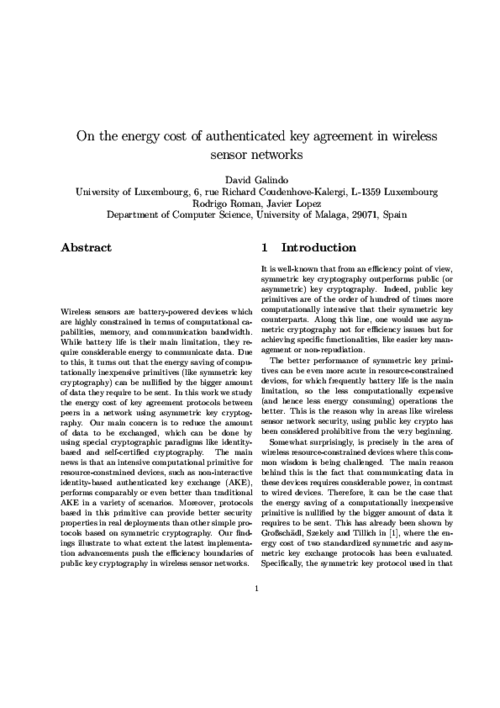| Title | On the Energy Cost of Authenticated Key Agreement in Wireless Sensor Networks |
| Publication Type | Journal Article |
| Year of Publication | 2012 |
| Authors | D. Galindo, R. Roman, and J. Lopez |
| Journal | Wireless Communications and Mobile Computing |
| Volume | 12 |
| Pagination | 133-143 |
| Date Published | Jan 2012 |
| Publisher | Wiley |
| ISSN Number | 1530-8669 |
| Keywords | identity-based key agreement, key distribution, pairings, underwater wireless sensor networks, wireless sensor networks |
| Abstract | Wireless sensors are battery-powered devices which are highly constrained in terms of computational capabilities, memory and communication bandwidth. While battery life is their main limitation, they require considerable energy to communicate data. Due to this, it turns out that the energy saving of computationally inexpensive primitives (like symmetric key cryptography (SKC)) can be nullified by the bigger amount of data they require to be sent. In this work, we study the energy cost of key agreement protocols between peers in a network using asymmetric key cryptography. Our main concern is to reduce the amount of data to be exchanged, which can be done by using special cryptographic paradigms like identity-based and self-certified cryptography. The main news is that an intensive computational primitive for resource-constrained devices, such as non-interactive identity-based authenticated key exchange, performs comparably or even better than traditional authenticated key exchange (AKE) in a variety of scenarios. Moreover, protocols based in this primitive can provide better security properties in real deployments than other simple protocols based on symmetric cryptography. Our findings illustrate to what extent the latest implementation advancements push the efficiency boundaries of public key cryptography (PKC) in wireless sensor networks (WSNs). |
| URL | http://dx.doi.org/10.1002/wcm.894 |
| DOI | 10.1002/wcm.894 |
| Citation Key | Galindo2010 |
On the Energy Cost of Authenticated Key Agreement in Wireless Sensor Networks
Paper File:
https://nics.uma.es:8082/sites/default/files/papers/Galindo2010.pdf
